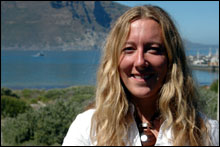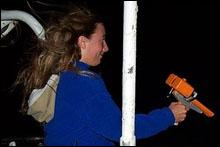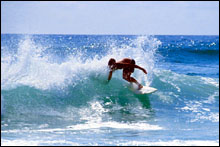On the crest of a wave - Juliet gets ready to steer new SAEON node to success
|
Dr Juliet Hermes has just taken up her position as manager of SAEON’S recently established node for marine-offshore systems. SAEON eNews caught up with this dynamo to talk to her about her plans for the node and her passion for the sea and for oceanography.
Dynamite comes in small packages. This becomes apparent not long into the interview as Juliet's passion for her subject starts making its presence felt.
Juliet represents a new generation of marine researchers who have participated in research projects across the globe. These young researchers are determined to tackle environmental issues such as global warming and climate change in a coordinated way for maximum impact.
Juliet has literally travelled the world. Her studies and participation in seminars and workshops have taken her to places as far afield as France, Marion Island, Hawai'i, the Prince Edward Islands, Antarctica, Zanzibar, Brazil, India, Mauritius, Australia and Namibia.
Juliet is ideally suited to her new position. Besides being a postdoc (research, lecturing and consulting) at the University of Cape Town's oceanography department where she obtained her PhD, she has participated in a number of oceanographic cruises including one in the Southern Ocean and various others in the UK, and is used to working with large datasets. During her travels she has also established contact with marine researchers from all corners of the world.
Testing the waters
"Being a surfer, I have always been interested in coastal oceanography and wave dynamics," Juliet says. "I find all aspects of oceanography fascinating."
She came to South Africa in 2001 to do a PhD in Oceanography at the University of Cape Town (UCT) on ocean model diagnosis of variability in the South Indian Ocean. In 2005, as Indian Ocean research fellow at UCT, she conducted research using a Regional Ocean Model, ROMS to investigate the Indian Ocean thermocline ridge. Having been awarded the Claude Leon fellowship at UCT, she is currently an investigator on the South African National Antarctic Programme (SANAP) funded project "Antarctic impacts on South African climate".
"The overall goal of the project is to better understand variability in the Southern Ocean and the impacts this has on South African rainfall," she explains. The project will potentially lead to an improved long-range forecasting of rainfall and temperature over South Africa.
Juliet is excited about South Africa's latest push to the Antarctic. She became involved in the project prior to landing the position at SAEON. "But my involvement with SANAP will tie in nicely with what I will be doing at SAEON," she says.
Although as an undergraduate she was interested in marine, plant and chemical biology, she opted to pursue physical oceanography as soon as she discovered it. In her new position at SAEON she will deal with all aspects of marine science. "SAEON will monitor the marine environment in its broadest sense - not just large-scale physical oceanography, but also coastal, chemical, and biological oceanography," she says. "These are all interrelated."
Juliet has found that the interactions between physical and biological oceanography are understudied and she is keen to pursue this.
"In the SANAP research, for instance, whale migratory patterns depend on krill and krill in turn depends on the physics," she explains. "A former colleague at UCT is involved in research determining the travelling patterns of sea lions because that can show you where the frontal areas are located in the ocean. Birds also generally feed in the frontal areas where there is more activity. So it's all tied up. We don't know how well yet. That's something we need to investigate."
Juliet's broad interests include long-term variability in the oceans surrounding South Africa and the forcing mechanisms behind this on large-scale through to meso-scale processes.
"This is both significant and topical as it is well known that variability in the ocean can modulate climate and weather patterns," Juliet says, "thus a better understanding of such variability can potentially lead to improved long-range forecasting of rainfall and temperature."
Research for her PhD focused on the large-scale inter-annual variability of the oceans bordering South Africa and the inter-ocean fluxes south of Africa on monthly through to inter-annual timescales. Evidence exists that sea surface temperature variability in the South Indian Ocean (in particular, the Agulhas Current) may significantly influence weather and climate patterns in the southern African region, potentially impacting on a huge number of people relying on rain-fed subsistence farming.
Due to a lack of coherent long-term observations in these regions, Juliet's research has largely focused on ocean model results. Such model studies are vital to highlight areas which need improved long-term monitoring systems and this is the goal of her current research, all of which is a near-perfect fit for SAEON with its mandate of long-term observation.
"SAEON's interface with research is vital"
Juliet is passionate about the role that SAEON will be playing in providing long-term observation data for research, and the role that she will be playing in the future to see to it that the data products get to inform research.
Being involved in modelling has highlighted the importance of long-term monitoring for her because she felt the need to have reliable observations. "Observations are vital to validate and feed back into the models to improve them and to then do scenario-type work and forecasting," she explains.
What is also important is to start feeding that information through to decision-makers. She regards a focus on science for management as essential to protect and preserve marine and coastal resources, and to uplift coastal communities' livelihoods.
Another aspect that appeals to her is SAEON's mandate of data dissemination. By sharing data we all learn more, she says, so let's talk and work together. Coming from academia she is fully aware that this doesn't always happen. Researchers do not want to talk about opportunities because they do not want to risk losing them. "But with SAEON the idea is that we will share data, and as we share data, we will create new opportunities," she says.
If people do not share data, research projects may be duplicated. "That's where metadata comes in," she explains, "to let people know about your research. This enables you to form strong connections – the opportunities are going to be even greater. You will get access to a broad spectrum of knowledge instead of working in silos, which all add up to allow trends to emerge."
By working together we can entrench South Africa's position as a major research destination, and position SAEON as a facilitator of knowledge, she says. People the world over will be able to contact SAEON researchers to find out what is happening in the region in terms of observation. It will help put South Africa on the international long-term observation radar screen.
"Why shouldn't we have systems like they have in the States," she asks, "where they do data simulation and modelling? South Africa should set up its own centre and SAEON would be pivotal in this in terms of observation. SAEON will disseminate research results with the marine research community as well as to the broader community. SAEON has the potential to become an African ‘centre of excellence' in the marine and coastal environment, linking ecosystem research, marine biodiversity, marine science and society.
She would like to do a situation analysis to find out exactly how SAEON could fit in with international systems such as the Group on Earth Observations (GEO) system. "SAEON could really make its presence felt because those observations would be vital to feed into models. This is what the future is going to demand."
Referring to SAEON's link with ELTOSA and ILTER, she stresses the importance of regional and international collaboration. "But then we must always remember that while we can learn from them, SA has a lot to offer. We are experts on our region and in our specific fields of study," she says.
Marine research in South African context - national benefits
Juliet feels strongly about the fact that marine science should include society and development. Coastal communities experience the environmental and economic impacts of the ocean, which include the depletion of natural resources, disasters and coastal development. This requires an understanding of the environmental, socio-economic, and cultural dimensions of the impacts.
She regards a multidisciplinary marine science research agenda as vital. "We should seek to research and initiate sustainable development initiatives for poor coastal communities that strive to reap full benefits from their immediate marine resources,' she says.
There is also a need for community-based early warning systems and long-term disaster management and mitigation plans. A national marine risk assessment system and disaster management for coastal communities should be jointly developed by social scientists and natural scientists working together in the marine environment. This will provide a valuable opportunity for researchers in both fields to collaborate, and will provide tools for the proactive management of marine and coastal ecosystems, inclusive of people.
Government has also called for research projects to focus on those areas in marine research where there is (or is likely to be) a comparative advantage for South Africa. These include ecosystem research and marine biodiversity, and programmes that will harness existing national scientific and technological competencies in marine science while expanding its demographic profile of researchers.
Juliet agrees. "While we are so ideally situated for Antarctic studies we should, for example be a world centre for Antarctic studies," she says.
Building bridges
Juliet feels strongly about the need to harmonise marine scientific initiatives and promote collaboration within the broader South African research community. SAEON could provide a platform to co-ordinate marine research and create and advance multidisciplinary research opportunities, she says. Initiatives should promote studies spanning a broad range of processes and spatial scales.
South Africa has a strong and active marine research establishment comprising various institutions and several thousands of individuals; yet their areas of specialization, either as institutes, individual researchers or groups of researchers are often not clearly defined, easily available in a database, and/or communicated effectively.
Juliet emphasizes the need for a comprehensive database that provides a clear picture of the marine research establishment and its endeavours. Diverse research is ongoing in all fields of marine science, and all of it is important. What is lacking is coordination in terms of scientific effort as well as well-planned countrywide information dissemination.
She has already started working closely with other node managers, in particular Dr Angus Paterson of the SAEON Elwandle Node for the coastal-inshore zone, and with other role players in South African marine research such as MCM, SADCO (CSIR) and UCT.
Global impacts
According to Juliet, although the Agulhas Current has been studied with observations, remote sensing and ocean models, there are still many unanswered questions. For example, it has been shown that weather forecasting models underestimate the influence of the current on the overlying atmosphere. The air-sea interactions in this area need further scientific investigation to evaluate the influence of the current on overlying atmosphere. Clearly such oceanographic research has strong implications for understanding climate change.
Interest in the southern African climate's links with the Indian and Pacific oceans remains strong, and ongoing research in this area is important. Growing understanding of how the regional climate system operates provide strong evidence that climate has changed over the last century, and will continue to do so in a manner that could place increasing stress on societal structures.
Juliet speaks about the need for a regional warning system, which requires scientific input into multiple potential marine hazards. Research on climate change needs to focus on and recognise threats such as acidification, and increased severity and frequency of sea level rise that climate change may cause as well as violent storms, the severity of which is difficult to forecast.
New remote sensing products and analysis techniques have shed further light on the variability of the neighbouring oceans. Ocean remote sensing can also be used for early warning of potential ocean disturbance similar to the earthquake that causes the destructive Tsunami in 2006.
Capacity building
Although Juliet grew up in Cornwall, a region which played a vital part in Britain's proud seafaring history, she initially saw seafaring, sailing and surfing as male-dominated occupations. It was only later when she came of age that she realized that she could live her love of the sea and study oceanography. "Suddenly, after 20 years the world became my oyster …," she says with a smile.
She sees it as something of a mission to attract students into marine science. "It is so important to make our young people aware of what is happening with our oceans," she says.
She would like to be involved in programmes to develop a new generation of marine researchers and establish a ‘critical mass' of local marine scientists. "Oceanography is becoming increasingly important and there are so many career opportunities for people studying it," she says. "That will be a drawcard for more students at our universities. There are also so many chances for students to get hands-on experience and go to sea, especially down to the Antarctic."
She has been selected for a START/PACOM award to run a series of workshops based on modelling the impact of large scale climate variability on sensitive East African coastal areas. Scientifically, this project is aimed at improving our understanding of climate variability, whilst improving the modelling capacity within southern Africa and providing opportunities for young scientists to further their careers by becoming involved in projects which will have a direct impact on them. Students will develop essential modelling skills and the training needed to run a regional ocean model. These types of skills are becoming increasingly important for a career in oceanography and climate studies.
"I really enjoy lecturing and mentoring students. I think my enthusiasm and passion for oceanography is evident when I lecture," she says.
Her passion for teaching will now be directed towards science education outreach, another part of her new position at SAEON that she is looking forward to.
What makes Juliet tick?
Juliet says that her interest and love of the ocean is not purely work driven, and that she spends as much free time as possible in the water surfing, although if it's flat you might find her snorkeling, diving or, if the chance arises, snowboarding!
Contact details
Dr Juliet Hermes, SAEON, Marine and Coastal Management, Private Bag
X2, Roggebaai, Cape Town, South Africa, 8012
Fax :+27-21-402 3674
Email: Juliet@saeon.ac.za













